Comprehensive Guide to Garden Maintenance in Canary Wharf
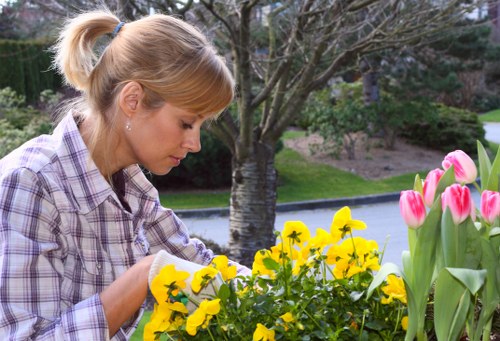
Introduction to Garden Maintenance in Canary Wharf
Living in Canary Wharf offers a unique blend of urban sophistication and green tranquility. Maintaining a garden in this bustling financial hub requires a thoughtful approach to ensure that your outdoor space remains vibrant and inviting throughout the year. Whether you have a spacious terrace garden or a compact balcony, proper garden maintenance can significantly enhance your living environment.
In this article, we will explore various aspects of garden maintenance in Canary Wharf, providing you with practical tips and strategies to keep your garden lush and healthy. From selecting the right plants to efficient watering practices, we've got you covered.
Understanding the local climate and environmental conditions is crucial for successful garden maintenance. Canary Wharf experiences a temperate maritime climate, characterized by mild winters and cool summers, which influences the types of plants that thrive here.
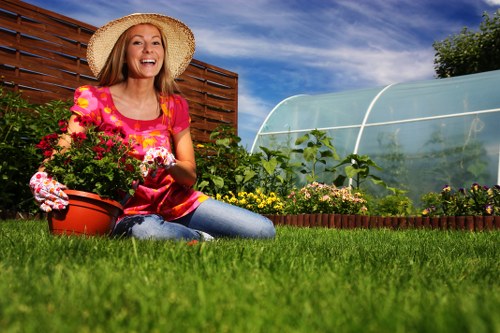
Choosing the Right Plants for Canary Wharf Gardens
Climate-Resilient Plants
Selecting plants that are well-suited to the Canary Wharf climate is essential for minimizing maintenance efforts. Here are some climate-resilient options:
- Evergreens: Provide year-round greenery and require minimal care.
- Perennials: Return every year and offer a variety of colors and textures.
- Succulents: Ideal for low-water gardens, adding a modern aesthetic.
Incorporating native plants can also enhance garden sustainability by supporting local biodiversity and reducing the need for excessive watering or fertilization.
Container Gardening
Given the limited space in Canary Wharf, container gardening is a popular choice. It allows for flexibility and easy management. Consider using containers that match your garden's style and ensure they have proper drainage to prevent waterlogging.
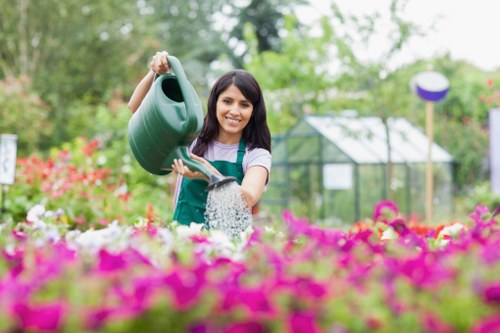
Essential Garden Maintenance Practices
Regular Pruning and Trimming
Pruning helps maintain the shape and health of your plants. It removes dead or diseased branches, promotes better airflow, and encourages new growth. Schedule regular pruning sessions, especially during the growing season, to keep your garden looking its best.
Weeding and Soil Care
Weeds can quickly overrun your garden, competing with your plants for nutrients and water. Regularly inspect your garden for unwanted growth and remove weeds promptly. Additionally, maintaining healthy soil through composting and mulching can improve plant resilience and reduce weed proliferation.
Composting
Composting not only reduces waste but also enriches your soil with valuable nutrients. You can create a simple compost bin using kitchen scraps and garden waste, turning them into rich organic matter for your plants.
Mulching
Applying mulch around your plants helps retain moisture, regulate soil temperature, and suppress weed growth. Organic mulches like bark or straw are excellent choices for Canary Wharf gardens.
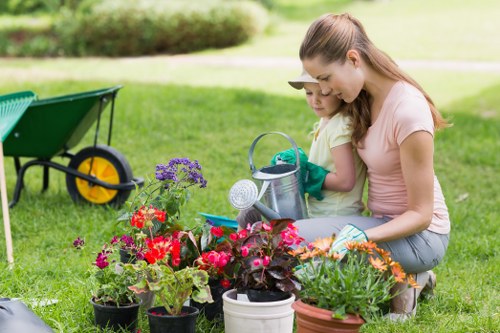
Efficient Watering Techniques
Understanding Water Needs
Different plants have varying water requirements. It's important to understand the specific needs of your garden's flora to prevent overwatering or underwatering. Factors such as plant type, soil composition, and weather conditions influence watering schedules.
Watering Methods
- Drip Irrigation: Delivers water directly to the plant roots, minimizing evaporation and water waste.
- Sprinkler Systems: Suitable for larger gardens, ensuring even water distribution.
- Hand Watering: Allows for precise control, ideal for delicate or newly planted areas.
Implementing efficient watering techniques not only conserves water but also ensures that your plants receive the optimal amount needed for growth.
Rainwater Harvesting
Consider setting up a rainwater harvesting system to collect and store rainwater for garden use. This sustainable practice reduces dependence on municipal water supply and provides your plants with natural, chemical-free water.
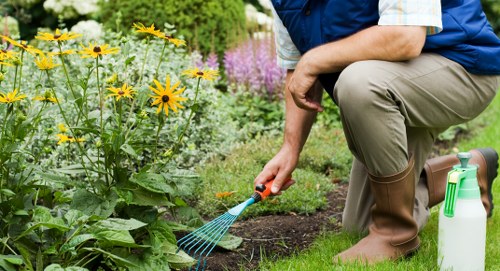
Pest and Disease Management
Identifying Common Pests
Maintaining a healthy garden involves vigilant monitoring for pests and diseases. Common garden pests in Canary Wharf include aphids, slugs, and caterpillars. Early detection is key to preventing infestations.
- Aphids: Small insects that suck sap from plants, causing stunted growth.
- Slugs: Feed on leaves and stems, leaving unsightly damage.
- Caterpillars: Can defoliate plants rapidly if left unchecked.
Organic and Chemical Solutions
When dealing with pests, opt for organic methods whenever possible to maintain an eco-friendly garden. Natural remedies include introducing beneficial insects like ladybugs, using neem oil, or creating homemade sprays from garlic and chili.
If organic methods are insufficient, carefully selected chemical treatments can be used as a last resort. Always follow the manufacturer's instructions to minimize environmental impact.
Preventative Measures
Preventing pest and disease issues is more effective than treating them. Maintain good garden hygiene by removing dead plant material, rotating crops, and planting pest-resistant varieties.

Seasonal Garden Maintenance Tips
Spring
Spring is the perfect time to prepare your garden for the growing season. Focus on soil preparation, planting new seeds, and pruning. Ensure your garden beds have sufficient nutrients by adding compost or organic fertilizers.
Summer
During summer, emphasize watering and pest control. Monitor plants for signs of stress and provide shade for sensitive species if necessary. Regularly deadhead flowers to encourage continuous blooming.
Autumn
Autumn involves clearing fallen leaves, protecting plants from the impending cold, and planting bulbs for spring. It's also a good time to assess your garden's overall health and plan for any changes in the coming year.
Winter
In winter, focus on minimal maintenance. Protect perennial plants, clean garden tools, and plan your garden layout for the next growing season. Utilizing indoor gardening techniques can also keep your green space thriving during the colder months.

Utilizing Professional Garden Maintenance Services
Benefits of Hiring Professionals
Maintaining a garden in the urban setting of Canary Wharf can be challenging due to time constraints and space limitations. Hiring professional garden maintenance services offers several advantages:
- Expertise: Professionals have the knowledge and experience to tackle various gardening challenges effectively.
- Time-Saving: Outsourcing maintenance tasks frees up your time for other activities.
- Quality Results: Ensures your garden remains in optimal condition with regular care and attention.
Choosing the Right Service Provider
Selecting a reputable garden maintenance company involves considering factors such as experience, range of services, customer reviews, and pricing. Look for providers who understand the unique needs of Canary Wharf gardens and offer tailored solutions.
Services Offered
Common services include:
- Lawn Care: Mowing, fertilizing, and pest control.
- Planting and Landscaping: Designing and implementing garden layouts.
- Seasonal Cleanup: Preparing your garden for different seasons.
Customized Maintenance Plans
Many professional services offer customized maintenance plans to suit your specific needs and budget. Discuss your requirements with potential providers to create a plan that ensures your garden receives the appropriate care year-round.

Sustainable Garden Practices
Eco-Friendly Gardening
Adopting sustainable gardening practices not only benefits the environment but also enhances the health of your garden. Here are some eco-friendly strategies:
- Composting: Reduces waste and enriches soil naturally.
- Rainwater Harvesting: Conserves water resources.
- Organic Fertilizers: Promote soil health without harmful chemicals.
Energy-Efficient Lighting
Incorporate energy-efficient lighting solutions to illuminate your garden without increasing your energy consumption. Solar-powered lights are an excellent option, providing illumination while harnessing renewable energy.
Native Plants
Planting native species supports local wildlife and requires less maintenance, as these plants are naturally adapted to the local climate and soil conditions.
Reducing Chemical Use
Minimize the use of chemical pesticides and fertilizers to protect beneficial insects and maintain a healthy ecosystem within your garden.

Innovative Garden Design Ideas for Canary Wharf
Vertical Gardening
Maximize your limited space with vertical gardening techniques. Using trellises, wall-mounted planters, and hanging baskets allows you to grow more plants without occupying valuable floor space.
Smart Gardening Solutions
Integrate smart technology into your garden maintenance routine. Automated irrigation systems, smart lighting, and garden monitoring tools can enhance efficiency and ease of care.
Indoor-Outdoor Living
Create a seamless transition between indoor and outdoor spaces by using consistent design elements and incorporating indoor plants that thrive both inside and on terraces or balconies.
Minimalist Garden Design
Embrace a minimalist approach with clean lines, simple plant selections, and uncluttered layouts. This style not only looks sophisticated but also requires less maintenance.

Cost-Effective Garden Maintenance Strategies
DIY Maintenance Tips
Managing your garden can be cost-effective with the right DIY strategies:
- Reuse and Recycle: Repurpose containers and materials for your garden projects.
- Seed Saving: Save seeds from your favorite plants to reduce purchasing costs.
- Natural Pest Control: Utilize homemade remedies and natural predators to manage pests.
Budget-Friendly Tools and Resources
Investing in essential gardening tools can streamline maintenance tasks without breaking the bank. Look for quality tools that offer durability and efficiency.
Essential Tools
Some must-have tools include:
- Pruners: For precise trimming and pruning.
- Garden Fork: Ideal for aerating soil.
- Watering Can: Essential for manual watering needs.
Resource Sharing
Join local gardening groups or communities in Canary Wharf to share resources, tips, and even tools. This can significantly reduce costs and enhance your gardening knowledge.

Maintaining Garden Health Year-Round
Regular Inspections
Conduct thorough inspections of your garden at least once a week. Look for signs of plant stress, pest infestations, or disease symptoms. Early detection allows for prompt intervention, preventing minor issues from escalating.
Balanced Fertilization
Providing your plants with a balanced diet of nutrients is crucial for their growth and resilience. Use organic fertilizers to maintain soil fertility and support healthy plant development.
Proper Drainage
Ensure that your garden has adequate drainage to prevent waterlogging, which can lead to root rot and other plant diseases. Elevate containers if necessary and avoid overwatering.
Soil Testing
Regularly test your soil to determine its pH level and nutrient content. This information helps you make informed decisions about fertilization and soil amendments.
Integrated Pest Management (IPM)
Implement IPM practices to manage pests sustainably. This approach combines biological, cultural, and mechanical methods to reduce pest populations while minimizing environmental impact.

Enhancing Garden Aesthetics
Creative Plant Arrangements
Arrange plants in visually appealing patterns and combinations. Mixing different textures, colors, and heights can create a dynamic and attractive garden space.
Decorative Elements
Incorporate decorative elements such as garden sculptures, water features, or stylish planters to add personality and charm to your garden.
Lighting Accents
Use garden lighting creatively to highlight focal points and extend the usability of your garden into the evening hours. Solar lights, string lights, and lanterns are excellent choices.
Pathways and Borders
Define garden spaces with pathways and borders. Materials like gravel, stepping stones, or reclaimed wood can add structure and aesthetic appeal.

Maximizing Space in Urban Gardens
Terrace and Balcony Gardens
Urban living often means limited outdoor space. Efficiently utilizing terraces and balconies can create beautiful garden retreats. Opt for space-saving furniture and vertical storage solutions to maintain an organized and functional area.
Small Space Solutions
- Hanging Planters: Utilize vertical space for additional planting areas.
- Compact Furniture: Choose furniture that doesn't overwhelm your space.
- Multi-Functional Elements: Select features that serve multiple purposes, such as benches with storage.
Vertical Planting Systems
Implement vertical planting systems like green walls or tiered plant stands to maximize your growing area without sacrificing floor space.
Smart Storage
Incorporate smart storage solutions to keep gardening tools and supplies neatly organized, ensuring your garden remains tidy and efficient.

Seasonal Challenges in Garden Maintenance
Dealing with Cold Weather
Cold weather poses specific challenges, such as frost damage and reduced plant growth. Protect your garden by using frost covers, mulching heavily, and selecting cold-tolerant plant varieties.
Managing Excessive Heat
During heatwaves, plants can suffer from dehydration and sunburn. Mitigate these effects by providing ample shade, increasing watering frequency, and using heat-resistant plant species.
Frost Protection
Use frost cloths or blankets to cover sensitive plants during cold nights. This simple measure can prevent significant damage and ensure plant survival through winter months.
Heat Mitigation
Incorporate heat mitigation strategies such as installing pergolas, using reflective mulches, and selecting plants with high water retention capabilities.

Integrating Technology in Garden Maintenance
Smart Irrigation Systems
Investing in smart irrigation systems can optimize your watering schedule based on weather data and soil moisture levels. These systems enhance water efficiency and ensure your plants receive the right amount of hydration.
Garden Monitoring Tools
Utilize garden monitoring tools like soil sensors and climate monitors to keep track of environmental conditions. These tools provide valuable insights, allowing you to make informed decisions about garden care.
Automated Lighting
Automate your garden lighting to adjust based on the time of day or ambient light levels. This not only adds convenience but also enhances the security and aesthetics of your garden.
Mobile Apps for Garden Management
Leverage mobile apps designed for garden management to schedule tasks, track plant growth, and receive maintenance reminders. These apps streamline your garden care routine and help you stay organized.

Conclusion: Achieving a Beautiful Garden in Canary Wharf
Maintaining a garden in Canary Wharf is a rewarding endeavor that enhances your living space and provides a serene escape from the urban hustle. By implementing the right maintenance practices, selecting suitable plants, and utilizing professional services when needed, you can create a thriving and aesthetically pleasing garden.
Embrace sustainable gardening methods and leverage technology to make your garden maintenance more efficient and eco-friendly. With dedication and the right strategies, your Canary Wharf garden will flourish year-round.
Contact us today to learn more about our garden maintenance services and take the first step towards a beautiful, thriving garden in Canary Wharf.
